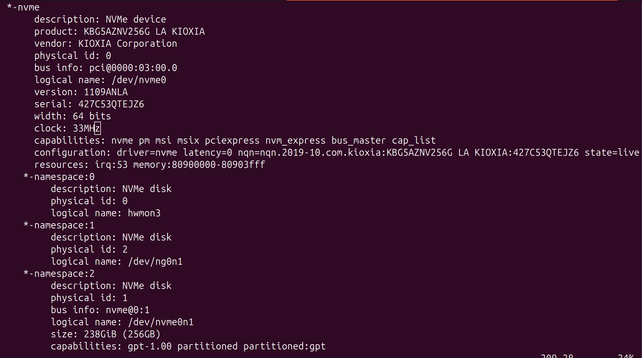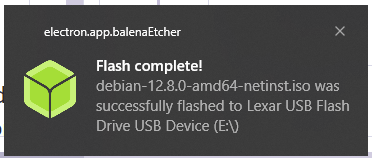Okay. Please help me as I ask COMPUTER BABBY QUESTIONS.
I have a Thinkpad T14 Gen 3 (AMD).
It has a 256 GB HD. That's too small. I want to buy a new, bigger one. I have a sense the good hard drives these days are "M.2".
Lenovo's specs page
doesn't say anything about "M.2". It says the hd is "PCIe".
I run "lshw" to see what's on the computer. It says "NVMe".
How do I find out the bestest fastest aftermarket drive Canada Computers carries that my computer will support
I only understand computation as the MANIPULATION OF ABSTRACT PLATONIC FORMS. I do not understand this realm where computers are "physical objects" you manipulate with "screwdrivers". I would prefer to use Math to translate my thoughts directly into action, as if I am casting magic spells
Okay. So I think I have my plans for the hard drive complete. Now here's the shedpainty question:
The old drive has Ubuntu 24.04 on it. I hate it.
Should I trade down to Debian?
Or should I trade up to Pop!_OS?
Will I regret either of these? Will either one, if I just go get a standard usb key installation, cause driver problems with my AMD chipset or secure boot or whatever other junk Lenovo has on board?
Okay I have more computer build babby questions
I got a hard drive
But I've been warned it's one that runs hot
So I think I want a thermal "strip", which is apparently a heatsink that fits into smol spaces like a laptop
I google
https://www.amazon.ca/Deal4GO-Heatsink-5B40Z68852-Replacement-Thinkpad/dp/B0CDSBKD1X
This looks good! Oh, they're out of stock. Except wait, why doesit say "replacement"?
I watch installation instructions
https://youtu.be/8sm1ScVUHqY?t=108
Is there a hd heatsink strip in my friggin laptop already?? (1/2)
I only want to open up the laptop once. Trying to decide if I should
(a) just open it and assume there's already a heatstrip
(b) I poke around and there's lots of weird blue polymer strips that seem to do the same thing? It wouldn't be that expensive to just buy one and have it around if it turns out there's not one in there already…
(c) set the computer preemptively on fire, so that the hard drive can't be the one to overheat it
(2/2)
Alright one last shedpainting question. Should I install Debian Stable or Debian Testing. Text replies welcome
@mcc Been running testing for a decade. I'm too impatient for stable.
Actually I also add unstable and sometimes experimental sources (particularly when there are major ongoing transitions and i'm impatient for everthing to flow from unstable->testing)
1/2
@lambdageek Hm. Is it correct that it's easy enough to install stable first and upgrade to testing if I change my mind later?
Also, just checking, is Debian gonna expect me to choose a kernel version myself? The last time I installed it was, uh, *checks* the year 2000, off a floppy disk net installer
@mcc yea, just switch/add sources and `apt full-upgrade`
Not sure what you mean by "choose a kernel version myself". there's a 'linux-image-amd64' package that has a dependency on the latest kernel package. it will upgrade like everything else. Although you may need to manually remove linux-image-n.nn.nn-amd64 packages - I don't think old kernels will automatically uninstall themselves - if your /boot or /boot/EFI starts getting full you might need to remove some.
@mcc Also personal preference: I use `aptitude` for package management.
In its preferences I change "the display format for package views" to:
%c%a%M%S %p %t %Z %v %V
which is the same as the default except with a %t - which shows if a package version is from "testing" or "unstable" or whatever. This is useful if you have multiple sources and apt suggests some weird upgrade for some reason
@mcc to be honest, these days I probably shouldn't bother with all of this and just run plain testing. It's been ages since I've added weirdo PPAs or installed a ton of -dev headers in order to compile something from sources. And modern languages come with their own package managers and toolchain installers anyways. if I had to do exotic C development these days I'd probably just do it in an ubuntu docker image. And for GUI stuff that's commercial or not in Debian I usually use flatpak
@mcc@mastodon.social @lambdageek@mastodon.social
choose a kernel version myselfJust go with
linux-image-amd64, cloud variant have way less drivers and features (like DRM which most DEs requires) enabled and is expected to be run on VPSes (might come in handy if you want a headless VM, though).https://wiki.debian.org/Cloud
The cloud kernel disables a large number of device drivers and primarily targets the Amazon EC2 and Microsoft Azure VM device models. It may be usable in other environments, but for maximum compatibility we recommend using the generic images.Funny enough, the option to choose between variants of kernel only shows itself if you use netinst iso, cloud kernel is not shown while installing from DVD iso and only default kernel (and versions) are choosable.
The manual kernel version (like
6.1.0-28) selection is only for when you have a specific kernel version in mind like, if you KNOW the latest kernel update would bork some of the features you use, or you need a specific kernel version to use some proprietary drivers, you may want to use a specific kernel version.



